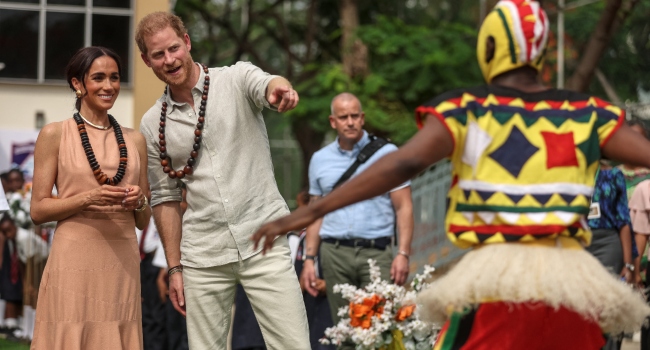Prince Harry and his wife Meghan Markle visited Nigeria on Friday as part of his promotion of the Invictus Games, the sporting event he founded for wounded military veterans.
The couple arrived Friday in the Nigerian capital Abuja where they visited a school to open an event on mental health for students there.
Greeted by a drum and dance group from the Igbo ethnic group, Prince Harry and Megan toured the Lightway Academy where they were welcomed by pupils.
“If you take anything away from today, just know that mental health affects every single person,” he told students, wearing a traditional Nigerian bead necklace around his neck.




“The more you talk about it the more you can kick stigma away.”
Meghan joined the Duke of Sussex on the stage before they left for a meeting with Nigerian military commanders as part of the Invictus programme.
“It was really cool. I just wanted to touch him,” said student Nnena Edeh, 13,as the prince left the school. “It was really inspiring.”
READ ALSO:
Kate, Princess Of Wales, Announces Cancer Diagnosis
Prince Harry was in London on Wednesday to mark the 10th anniversary of the games. As with all his trips to the UK since he moved to the United States in 2020, his visit prompted fresh speculation over a reconciliation with his family.
Harry, a former army captain who served as a helicopter pilot in Afghanistan, founded Invictus in 2014. Since then the games have expanded boosting rehabilitation through sports.
Last year, former Nigerian soldier Peacemaker Azuegbulam, who lost his leg in combat, became the first African to win a gold at the games in Germany.
Nigeria’s military said on Thursday that Harry would take part in a sporting event in the capital and also travel to Kaduna in Nigeria’s northwest to visit a military hospital and speak with troops wounded in combat.
He would later travel to the country’s economic capital Lagos.
Nigeria’s military forces are battling armed groups on several fronts.
A grinding jihadist insurgency in the country’s northeast has killed more than 40,000 people and displaced another 2 million more since 2009.
In northwestern and central states, heavily armed criminal gangs known locally as bandits carry out mass kidnappings for ransom and raid villages from camps hidden deep in remote forests.
AFP
